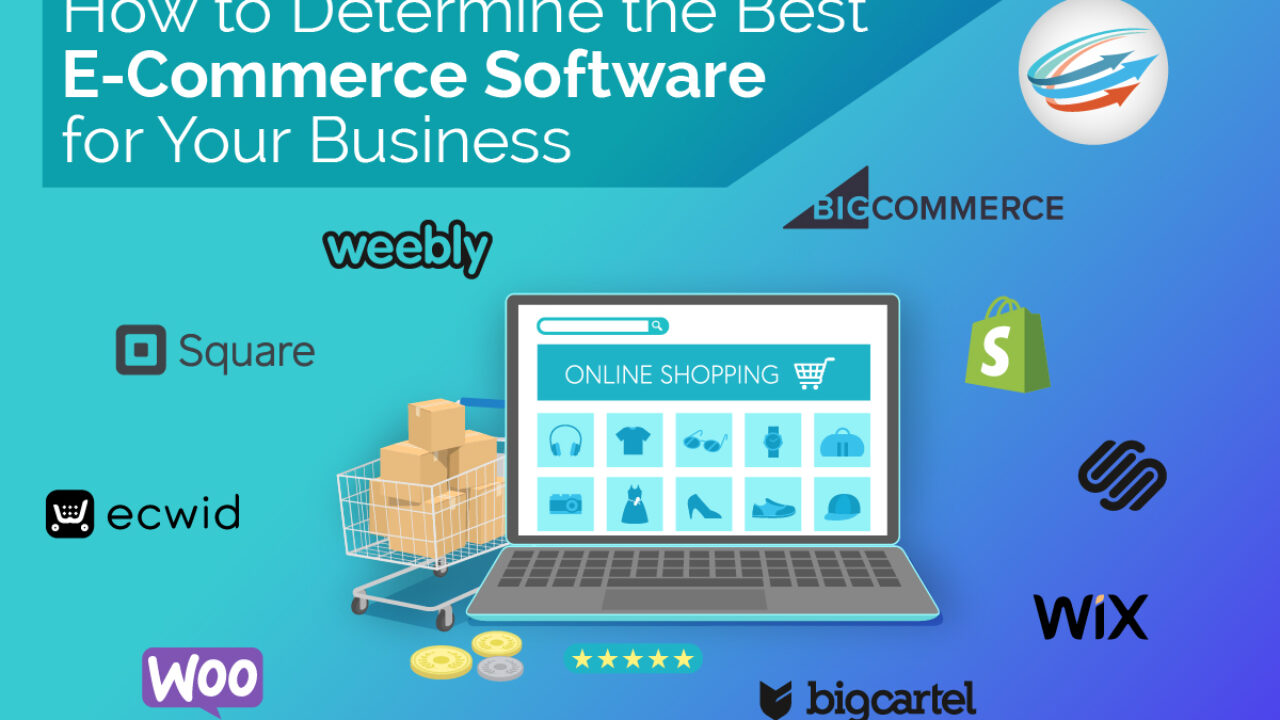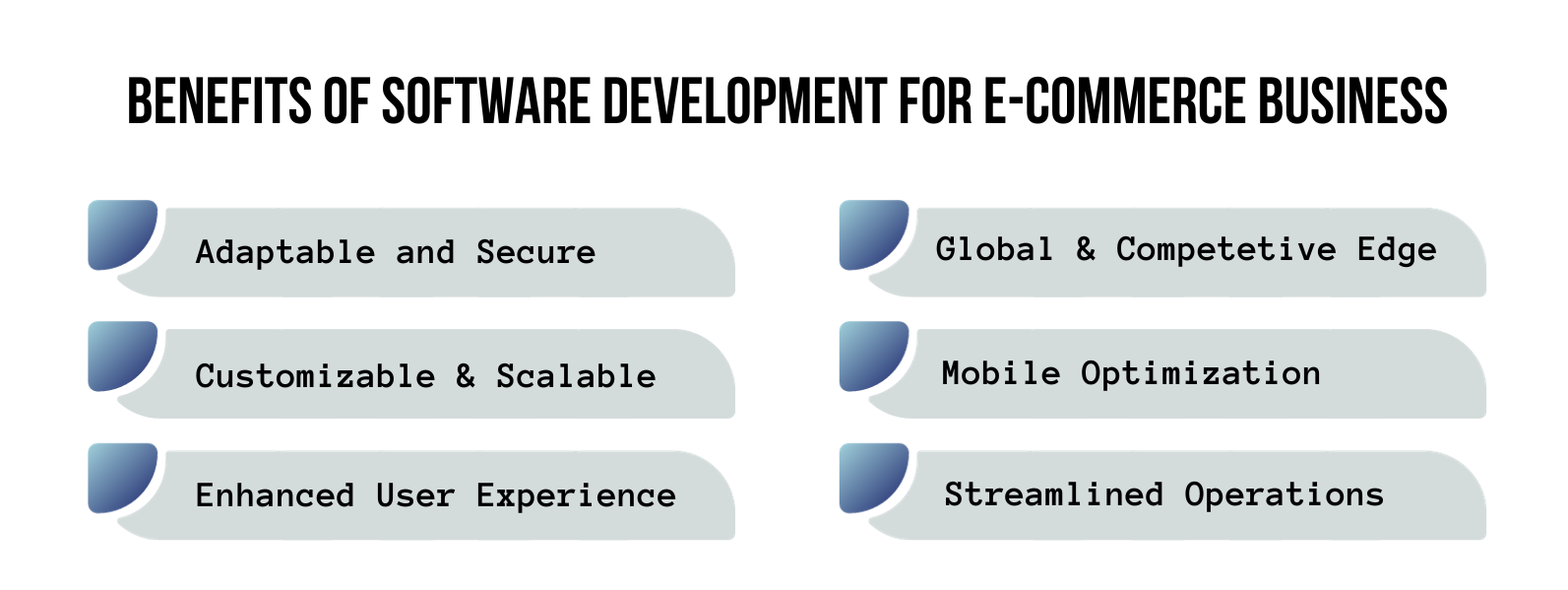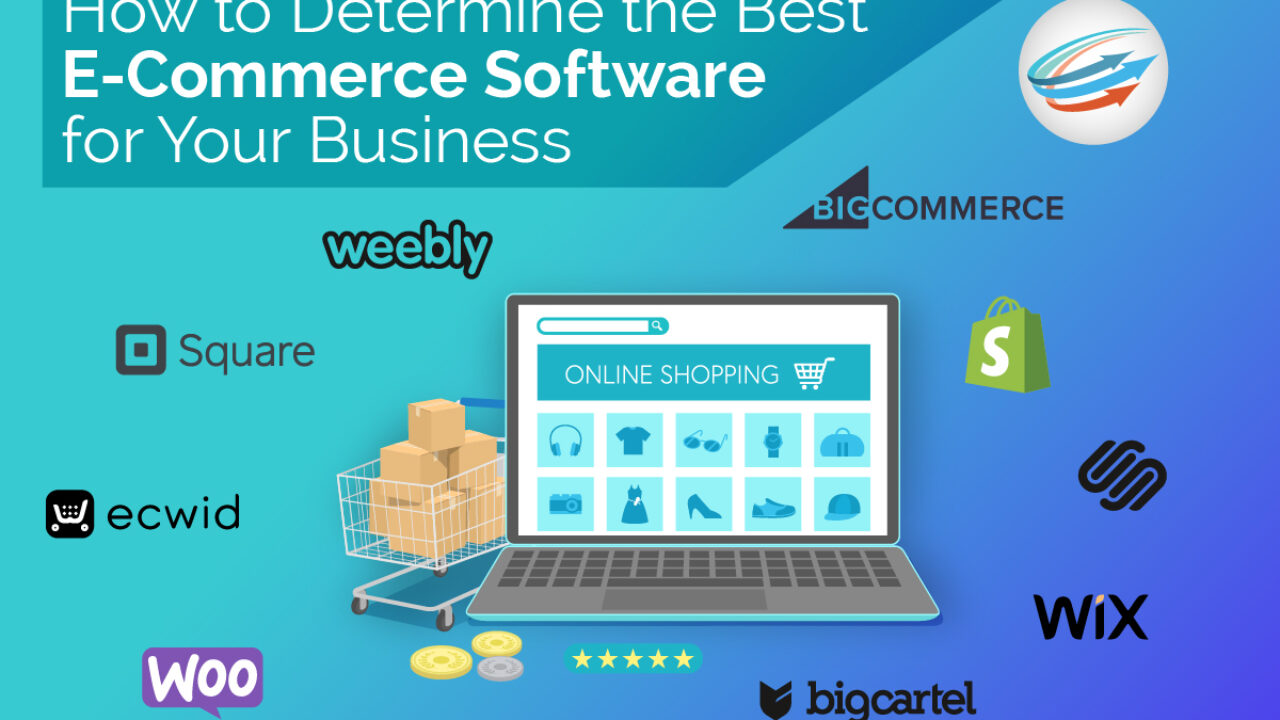
Unlock the potential of your online store with the right e-commerce business software. Imagine a tool that not only streamlines your operations but also boosts your sales and enhances customer satisfaction.
Sounds like a dream, right? But it's entirely possible. The right software can transform your business, giving you the competitive edge you need in the digital marketplace. Whether you're just starting out or looking to optimize your existing operations, understanding the benefits and features of e-commerce software is crucial.
Stay with us as we explore how this technology can revolutionize your business strategy and drive your success to new heights.

Selecting an e-commerce platform is crucial for business success. An ideal software should offer user-friendly features, robust security, and scalability. Explore options that align with your business needs and budget.
Choosing the right e-commerce platform is a pivotal decision that can set the stage for your online business success. With a plethora of options available, selecting the one that aligns with your needs might seem daunting. Your choice will impact everything from your site's functionality to your customer experience. So, how do you find the perfect match?
When evaluating e-commerce platforms, focus on features that cater directly to your business needs. Does the platform offer robust security measures to protect your customer's data? It's essential to ensure your users feel safe and secure during transactions. Consider scalability; your business will grow, and your platform should grow with it. Look for features like inventory management, payment gateway integration, and customizable design templates. These can enhance your operations and user experience. Don’t overlook customer support. A platform that provides 24/7 assistance can be a lifesaver when you encounter technical hiccups. Imagine launching a sale and your site crashes—having immediate support can make all the difference.
Let’s break down some popular e-commerce platforms. Shopify is known for its user-friendly interface and extensive app store, which allows you to add functionalities effortlessly. It's a favorite among small to medium-sized businesses for its ease of use. WooCommerce, on the other hand, is perfect if you love flexibility and control. Built on WordPress, it offers customization options but requires a bit of technical know-how. If you're tech-savvy, this might be your playground. Then there's BigCommerce, which stands out for its robust built-in features. If you want a comprehensive solution without relying on third-party apps, this platform might be ideal. It’s like having everything you need under one roof. Are you considering your business's future needs when choosing a platform? What features do you think will support your growth effectively? Remember, the right choice can propel your business forward, while the wrong one might hold you back.
Enhancing user experience is key in e-commerce. Customers expect seamless interactions. A smooth experience keeps them engaged. It builds trust and encourages repeat visits. Businesses need to focus on user-friendly design. Optimize every step of the buying journey. From browsing products to making a purchase. Addressing user needs can increase sales.
Responsive design adapts to different devices. It ensures the website looks good everywhere. Mobile phones, tablets, and desktops. People shop using various screens. A responsive site improves accessibility. Users have a better experience. They can browse easily without issues. This can lead to more conversions. Search engines favor responsive sites. It boosts search ranking and visibility.
The checkout process should be simple. Complicated steps can frustrate customers. Simplify forms and reduce clicks. Make it easy for users to complete purchases. Offer multiple payment options. Provide clear instructions and error messages. Fast checkouts enhance user satisfaction. It reduces cart abandonment. Happy customers are likely to return.
In the rapidly evolving world of e-commerce, leveraging data analytics is like having a secret weapon in your arsenal. Imagine having a crystal ball that reveals customer preferences, buying patterns, and product performance. Data analytics provides you with this power, helping you make informed decisions that drive your business forward. It’s not just about numbers; it's about understanding the story behind the data. Let’s dive into how you can harness data analytics to understand customer behavior and optimize your product listings.
Have you ever wondered why some products sell like hotcakes while others collect dust? By analyzing customer data, you can pinpoint the factors that influence purchasing decisions. Track metrics like page views, time spent on product pages, and cart abandonment rates.
Use these insights to tailor your marketing strategies. Create personalized recommendations based on previous purchases or browsing history. Think about how you can make the shopping experience more engaging and relevant for your customers.
Start small. Choose a few key metrics to focus on and gradually expand your analysis as you get comfortable. You don't need to be a data scientist; it's all about asking the right questions and interpreting the data effectively.
Data analytics can reveal surprising trends in your product listings. Are you optimizing your listings for maximum visibility and conversion? Analyze which keywords drive traffic and sales, and adjust your descriptions accordingly.
Consider the power of A/B testing. Compare different versions of product titles, images, and descriptions to see which performs better. Even small tweaks can lead to significant improvements in click-through rates.
Think about the last time you made a purchase online. What caught your attention? Use that insight to refine your product listings and make them irresistible to your customers. Are you ready to transform your e-commerce strategy with data analytics?
Integrating payment solutions streamlines transactions in e-commerce business software. This enhances user experience and ensures secure, efficient payment processing. Simplifying payments helps build trust with customers and boosts sales.
Integrating payment solutions in your e-commerce business can be a game-changer. This step not only streamlines the buying process but also enhances customer trust. Choosing the right payment solutions is crucial to ensure smooth transactions and customer satisfaction.
Security is a top priority in e-commerce. Customers need assurance that their payment information is safe. Implementing secure transaction methods builds confidence and encourages repeat purchases. Look into SSL certificates to encrypt sensitive data. This simple addition can safeguard customer information from potential threats. Don't forget to regularly update your security measures to stay ahead of cybercriminals.
Offering multiple payment options caters to diverse customer preferences. Not everyone uses the same payment method, and flexibility can enhance your business appeal. Consider integrating options like credit cards, digital wallets, and even cryptocurrencies. Imagine you're a customer ready to purchase but your preferred payment method isn't available. Frustrating, right? Avoid this scenario by providing a variety of choices, ensuring a seamless checkout experience. Think about the global reach of your business. Some international customers might prefer region-specific payment solutions. By accommodating these needs, you expand your market and boost sales. Are you offering the payment solutions your customers truly need? Evaluate your current setup and make the necessary adjustments. This proactive approach can significantly impact your e-commerce success.
E-commerce business software simplifies marketing efforts with tools for analytics, customer management, and sales tracking. These tools help businesses understand customer behavior and improve marketing strategies. Efficient software enhances overall productivity, aiding businesses in reaching their target audience effectively.
In the bustling world of e-commerce, utilizing marketing tools is essential to stand out and thrive. With countless platforms and strategies available, knowing how to effectively leverage these tools can make all the difference in your business success. Imagine the power of connecting with the right audience at the right time. It's not just about selling; it's about building relationships and trust. Let's dive into two critical marketing tools that can propel your e-commerce business forward.
Search Engine Optimization (SEO) is the backbone of online visibility. You want your products to be seen, right? That's where SEO comes in. Start by researching keywords that your potential customers are searching for. Once you have a list, incorporate them into your product descriptions, titles, and meta tags. This increases the chances of your site being found on search engines. Keep in mind that SEO is not a one-time task. Regularly update your content and track your rankings. Consistency pays off in the long run.
Email marketing remains a powerful tool for engaging customers. Crafting a compelling email starts with understanding your audience's needs. Ask yourself, what are they interested in? What problems can you solve for them? Personalize your emails. Address your customers by their names and tailor the content to their preferences. This makes them feel valued and heard. Consider setting up automated email campaigns. Whether it's a welcome series for new subscribers or a follow-up on abandoned carts, automation helps maintain contact without overwhelming your team. Have you ever received an email that felt like it was just for you? That's the level of connection you should aim for. Keep your messages clear and concise, and always include a call to action that encourages engagement. Utilizing marketing tools effectively can transform your e-commerce business, turning casual browsers into loyal customers. What strategies are you excited to try next?
E-commerce business software boosts customer support by streamlining communication. Automated tools handle inquiries, providing quick resolutions. Efficient systems enhance satisfaction, fostering loyalty and repeat purchases.
In the fast-paced world of e-commerce, enhancing customer support is crucial to building trust and fostering loyalty. Your customers expect immediate answers and seamless interactions. The right software tools can help you meet these expectations, ensuring your business thrives. Let's dive into how e-commerce business software can elevate your customer support game.
Live chat offers instant communication, bridging the gap between you and your customers. It's not just about answering questions—it's about creating a connection. Imagine a customer browsing your site at 3 AM, uncertain about a product. A live chat can provide reassurance and potentially convert that indecision into a sale. Customers appreciate real-time responses. It shows that you value their time and are ready to assist whenever they need. This instant interaction can significantly enhance their shopping experience, leading to positive reviews and repeat business. Moreover, live chat can handle multiple inquiries simultaneously. This efficiency means your team can support more customers without compromising on service quality.
Automation can streamline your support process, taking care of repetitive tasks. Think about those common questions like shipping times or return policies. By automating these, you free up your team to tackle more complex issues. This doesn't mean sacrificing personalization. Automated responses can be tailored to sound friendly and engaging, ensuring your brand voice remains consistent. Imagine a chatbot that not only answers queries but also recommends products based on customer preferences. This proactive approach not only helps customers but can also boost your sales. Are you worried about losing the human touch? Automation can work hand-in-hand with human support, where bots handle initial inquiries and pass on more complicated issues to your team. This balance ensures efficiency while maintaining that personal connection. Consider exploring these tools for your e-commerce business to enhance customer support. What changes could you make today to improve your customer interactions? Taking small steps in optimizing support can lead to significant gains in customer satisfaction and loyalty.
Scaling an e-commerce business can be a complex journey. It involves strategic planning and execution. Proper tools and software are essential in this process. They streamline operations and enhance growth potential. Understanding key areas can make scaling smoother.
Introducing more products can attract diverse customers. New categories can cater to different needs. Research market trends to identify popular items. Use analytics to understand customer preferences. This helps in making informed decisions on what to offer.
Quality should remain a priority. Sourcing reliable suppliers can ensure consistent standards. Product diversification can reduce dependency on specific items. It spreads risk and increases revenue streams.
International expansion can open new opportunities. Different regions offer unique customer bases. Conduct market research to identify potential countries. Understand local regulations and cultural differences. This knowledge aids in successful market entry.
Adapting marketing strategies is crucial. Tailor them to suit local preferences. Language localization can enhance customer experience. It fosters trust and increases engagement. Logistics and shipping must also be efficient. Reliable partners can ensure timely deliveries.

E-commerce business software is a digital tool that facilitates online transactions. It helps manage inventory, process payments, and enhance customer experience. This software streamlines operations, making it easier for businesses to sell products or services online. It's essential for businesses aiming to thrive in the digital marketplace.
E-commerce software simplifies online sales processes. It automates tasks, improves customer interactions, and boosts sales efficiency. By integrating various functions, it reduces manual effort and errors. This software is crucial for businesses seeking to expand their online presence and improve customer satisfaction.
E-commerce software enhances sales by providing a seamless shopping experience. It offers features like personalized recommendations and easy checkout options. This software also analyzes customer behavior to optimize marketing strategies. By improving user experience, it increases conversion rates and boosts sales revenue.
Yes, e-commerce software is designed with robust security features. It encrypts data, ensuring customer information is protected. Regular updates and security protocols guard against cyber threats. This software prioritizes safety, making online transactions secure for both businesses and customers.
Choosing the right e-commerce software is crucial. It supports your business growth. Consider features, cost, and ease of use. These factors matter. They help enhance your online store's performance. Aim for software that fits your needs. It's important for efficiency.
Research options thoroughly. A well-chosen platform can streamline operations. It also improves customer experience. Remember, your business depends on it. Taking the time to decide wisely pays off. Explore various tools available. Each offers unique benefits. Stay competitive by keeping your software updated.
Investing in good software supports success. Keep your e-commerce thriving.